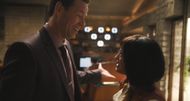The Studio has always walked the fine line between humor and offensiveness, but Episode 5, 'The War,' takes both to the extreme—executed with startling precision.
Preferably, that unknown players have been starting quarrels, the show has now turned into a battle of two corporate giants, where we witness a classic fight scene from the depositions of Kramer vs. Kramer, an old American movie.
“The War” incredibly unravels an even bigger issue of pride, status, and the innate problems in the studio environment.
The episode was directed by Seth Rogen and Evan Goldberg that are known for their film This is the End, and it was done in a humorous way with a lot of witty lines, rapid fire conversations, and stillness along with the hustle and bustle - the most stylish and tightly-knit episode yet from the series.
Plot Summary

In “The War,” executive Quinn Hackett (Chase Sui Wonders) runs into her veteran counterpart Sal Saperstein (Ike Barinholtz), who is already working on a low-budget Wink horror flick. Quinn goes on the offensive with Owen Kline, and Sal does the same with Parker Finn.
What starts as a merging of imaginative and creative worlds quickly turns into the lowest form of lateral competition—manipulated calendars, over-booked meetings, and leaving behind a nonsensical trail of a Netflix set’s devastation.
An HR intervention becomes necessary, putting a damper on the chaos where both executives have to settle to some sort of status quo. Sal loses his esteemed parking space and face, but agrees to support Quinn's vision, whereas Quinn will only halfheartedly promise to offer some respect to Sal.
Their relationship, however, stays darkly humorous—Sal rips on Quinn to his heart's content that she has $3,000 on her books for a ruined suit he’s owed from the fight.
Performances and Direction

Ike Barinholtz shines in this episode, oscillating between sharp bitterness and slapstick humor to brilliant effect. His characterization of Sal—a man who has outlasted many an incarnation from the studio system—captures the tragicomic absurdity of holding onto power in an industry that keeps evolving.
Chase Sui Wonders is still great as Quinn, who is interistically chaotic and dryly witty in her ambitious insecurities.
The episode is stylish visually and is in the top tier for this season. Rogen and Goldberg benefit from long takes as the confrontations in the office turn into cinematic spectacles reminiscent of Scorsese.
Those choices, which are somewhat uncharacteristic for sitcoms, bring weight to otherwise outrageous stunts. Unlike most workplace comedies, The Studio tries to place itself on a cinematic pedestal, although devoid of the seriousness that tends to accompany such efforts.
Satire and Themes

At its core, “The War” targets the absurdities and narcissism of Hollywood studio culture. The fight between Quinn and Sal, while comically exaggerated, reveals a more profound truth about the entertainment industry’s ego rifts: that creative choices are made not out of artistic value but for self-preservation and influence.
The episode also offers a sharp critique about the absurdity of workplace hierarchy with its human resources storyline, in which ‘real’ accountability amounts to little more than the offer of a designated parking space and a weak apology. It’s a sharp jab at how the industry often handles conflict: smoothing over deep-seated issues with symbolic gestures.
By ignoring the actual filmmakers and putting them into the argument about Wink, the show demonstrates how much corporate environments focused on image disregard creative input. The satire works because it never feels over-the-top; it just feels one step more absurd than the real world.
Final Verdict

“The War” is The Studio at its smartest and sharpest. From stylish direction to complete and utter performance perfection, an office turf war effortlessly turns into a hilarious and mind-blasting commentary on modern Hollywood. The writing is deep with layers, balancing physical comedy alongside power, insecurity, and the erosion of creatively risky decisions.
The episode’s homage to prestige filmmaking adds an ironic twist as petty studio politics transforms into cinematic drama: a ridiculous reality everyone laughs at and is bound to take seriously.
In or out of the industry, one thing is for sure: “The War” is bound to deliver a one-of-a-kind, character-bearing, ever so sharp, and super relatable form of comedy. A highlight not just from the season but for every single example of satirical television that exists.
